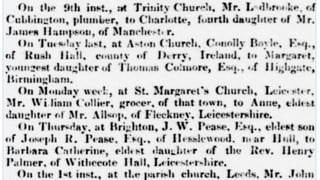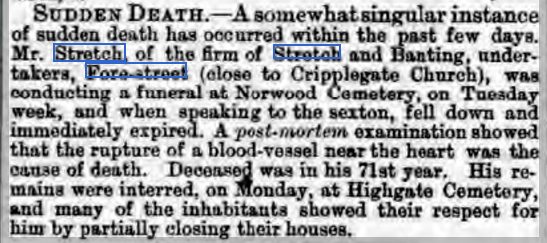I would not assume, as in this answer, that all of the events in the newspaper column are past events.
The phrase "next Monday" can be ambiguous. In the Southern USA, "Monday week" is used to disambiguate the closest Monday in the calendar ("Monday coming") from the following one.
For your example, today is Friday the 10th -- the closest Monday is the 13th -- Monday week is the 20th. (See update for one discussion of the issue, especially the comments from North Carolina.)
How can you tell if the usage in the Coventry Herald is the same, or different?
One thing you could try is to find the events from the area to confirm the language usage. When searching parish registers, remember that banns might be found in a different locality from the marriage itself.
You could also try looking for the same marriages in different newspapers (e.g. can the second couple, where the groom is from Ireland, be found in Irish newspapers?).
If you can't find any indexes online that would give you the precise marriage dates, try widening the area and then look for a newspaper article that announces the marriages you have from the parishes you can cross-check.
For the first marriage: the civil registration on Ancestry or FreeBMD gives us the full names of the couple: Charlotte Hampson
and Charles Ladbrook.
Name: Charlotte Hampson
Registration Year: 1843
Registration Quarter: Jan-Feb-Mar
Registration district: Coventry
Inferred County: Warwickshire
Volume: 16
Page: 319
A search of GENUKI, maps.familysearch.org, the FamilySearch catalog, etc. might tell you which if any of these parishes have records online. Once you have the actual event dates in hand, the language usage for the period would become clear.
You could also search other issues of the Coventry Herald, or other newspapers from that area, for references to historical events for which the dates are known.
I second the recommendation made by Mary Harrell-Sesniak in the post Understanding Terms Found in Historical Newspapers:
Whenever you find an “ultimo” reference, cross-reference the date with vital records, since the newspaper in this case is reporting on an event that happened the previous month and is not immediate. Reports were often reprinted from one paper to another, and after sufficient time had passed the original date may have become unclear. In addition, some historical newspapers occasionally used the “ultimo” reference to refer to an event from two months prior.
Consider that notices might have been copied from another paper -- if a date doesn't make sense, the "Monday week" might have originally been calculated from a different starting date.
Edited to add: for differences between the American and British usages see the post a week (from) tomorrow; Wednesday week posted on the blog separated by a common language.



